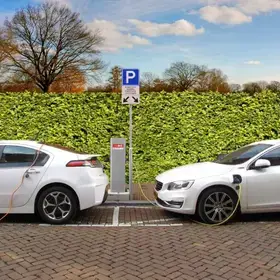By Dr. Steven Cohen, Senior Vice Dean, School of Professional Studies; Professor in the Practice of Public Affairs, School of International and Public Affairs
From defective batteries that burn down buildings, killing residents, to delivery guys passing red lights and riding on the wrong side of the road, a very important and beneficial new technology is exhibiting growing pains. We want to encourage electric transportation, but we also need to understand that new technologies bring new risks. Once we understand those risks, new technologies must be regulated to protect the people using the technologies and to protect the public.
The Adams administration is working to encourage e-bike use while focusing on charging safety. That is a good place to start. The mayor signed a set of new laws focused on battery safety. According to Aaron Ginsburg, reporting on the website 6sqft.com:
“To further regulate the quality of lithium-ion batteries sold in NYC, Adams signed five bills into law that will bolster the city’s effort to improve the safety of e-vehicles. Passed earlier this month, the bills will require the Fire Department of NY to submit reports and to develop an informational campaign educating the public on the fire risks of lithium-ion batteries. The bills have also prohibited the sale of e-vehicles that fail to meet safety standards and banned the reuse of used lithium-ion batteries.”
To encourage e-bike and scooter use, this summer, a pilot project is underway to allow e-bikes and scooters to be used in certain city parks. Again, according to Ginsburg:
“New Yorkers will soon be able to ride electric bikes and scooters in New York City parks legally. As part of a pilot program starting this summer, the city’s Department of Parks and Recreation will drop its current ban on certain electric vehicles on park drives and greenways, lifting a rule that conflicts with state laws. The pilot program is one part of a plan unveiled by Mayor Eric Adams on Tuesday aimed at promoting the safe usage of e-bikes and other electric micro-mobility devices and preventing fires caused by lithium-ion batteries. Called “Charge Safe, Ride Safe: New York City’s Electric Micromobility Action Plan,” the mayor’s plan focuses on four main areas to promote and incentivize safe e-vehicle usage, educating e-vehicle users, advocating for additional federal regulation of e-vehicles, and increasing enforcement against high-risk “hot spot” situations… .”
These are all positive and useful steps, but they are far from sufficient to ensure e-bike safety. We also need rules for riding and maintaining e-bikes once they are on the road. The enforcement starts with registering all vehicles that people can ride which are fully or partially powered by electric motors. It is impossible to regulate motor vehicles if they are not registered. While I don’t think we need driver’s licensing for bikes and scooters, we do need to know who owns and is responsible for these vehicles. I recognize that many of the owners of these bikes may not have legal immigration status. New York City has a way to connect these immigrants to the city’s governance system with a city-issued ID card. According to the New York City website:
“IDNYC is a card for all New Yorkers, from all backgrounds, and from all five boroughs. Your immigration status does not matter. The free, municipal identification card for New York City residents, ages 10 and up, provides access to a wide variety of services and programs offered by the City. IDNYC cardholders enjoy benefits and discounts offered by businesses and cultural institutions across the five boroughs.”
This ID system can be built upon and form the basis for e-bike and scooter registration. For a nominal fee, each e-bike and scooter should be registered with New York City and be provided with a license plate to display on the bike or scooter. The same people who administer the ID could administer the bike registration system. Every bike rider could be required to have either a City ID or a driver’s license. During registration, e-bike riders should be given a card with the “rules of the road,” and riders should be subject to the same rules and penalties that motorcycle riders must follow.
Earlier this year, the NYC Council passed a law mandating safe batteries for e-bikes. According to the E-Bike Lovers website:
“If you’re an electric bicycle user in New York City, you may have heard about a new law that was recently passed by the City Council to amend the administrative code. This law (Int 0663-2022) requires all electric bicycles sold in the city to be certified to UL 2849, all electric scooters to be certified to UL 2272, and all lithium-ion batteries for mobility devices to be certified to UL 2271. Violators of the law may be subject to a civil penalty of up to $1,000 per violation.”
These rules, like the city’s steps to encourage e-bikes, are a start, but new regulations must be enacted to ensure safe charging and riding. Even approved batteries can be damaged, so we need to check them both upon purchase and periodically. We also need a system to enforce these rules. To keep costs low, the FDNY can be the body that inspects e-bikes, and it could be done at the city’s firehouses which are conveniently located throughout the city. Since the Fire Department must deal with the damage caused by faulty batteries, they should be highly motivated to ensure that inspections are rigorous.
With the system in place, we then need the NYPD to enforce the rules of the road, possibly creating a unit that specializes in e-bike enforcement. When laws are broken, tickets are written. If tickets are ignored or if a rider proves reckless, they will forfeit their bike registration, and, in the worst case, their bike would be confiscated. Enforcement would be publicized so that riders see that the city is serious. Currently, there is no enforcement of traffic laws routinely ignored by e-bikes and scooters.
Most of the rules on e-bikes focus on the type of motor the bike has or on its battery, which is one part of the story. The other part is on the riding behavior of the person operating the bike. These days when I cross a street, even if I see a “walk” sign, I still look around to see if a bike or scooter is speeding toward me. Food delivery people are under pressure to move quickly and often view traffic rules as suggestions rather than mandates. Clearly, they have little concern that the traffic laws will be enforced. The absence of a driver’s license or vehicle registration complicates enforcement. When a car is speeding, a ticket can be issued charging the driver with the infraction. When a bike passes a traffic light, the options are a warning or an arrest. In New York City, the police simply ignore the situation.
As the nation and city decarbonize and move toward electricity-based energy systems, new technologies will continue to emerge, and we will need to develop rules to ensure that new technologies are deployed safely. Electric heat, electric ovens and stoves, heat pumps, home charging stations, solar cells, energy storage batteries, home generators, geothermal units, and other technologies will become more commonplace and will advance rapidly. The dangers presented as these technologies change and develop need to be understood and then regulated to ensure safety.
Most of the rules needed to manage the use of these technologies will be local. The rules governing their design and manufacturing will often need to be national. Technologies, such as social media algorithms and artificial intelligence, and smartphone-enabled business models, like Uber and Airbnb, have presented challenges to governments seeking to regulate them. They require technical knowledge and creative thinking that governments aren’t always capable of generating. Government needs to develop or purchase the technical expertise required to regulate new technologies. New York City has taken the first tentative steps to regulate e-bikes, but much more will still be required.
About the Program
The Columbia University M.S. in Sustainability Management program offered by the School of Professional Studies in partnership with the Climate School provides students cutting-edge policy and management tools they can use to help public and private organizations and governments address environmental impacts and risks, pollution control, and remediation to achieve sustainability. The program is customized for working professionals and is offered as both a full- and part-time course of study.



